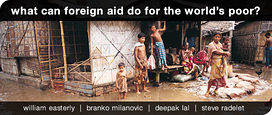Far be it from me to enter into the war of the econometricians between Bill Easterly and Steve Radelet. It is reminiscent of the similar war conducted by Rodrik and Sachs and Warner on the case for trade openness. As two eminent economists of an older generation who take a skeptical view of the current passion among the young for cross-country regressions wrote surveying that debate: “the squabbles among the foes and the friends of open trade, based on these crude cross-country regressions, amount to little more than ‘mutual assured destruction’ by (or perhaps the MADness of) what we might characterize as the RHS warriors!” [1] On the growing reliance on such regressions to provide ‘scientific’ evidence for one’s prior beliefs, Bob Solow rightly commented: “I do not find this a confidence inspiring project. It seems altogether too vulnerable to bias from omitted variables, to reverse causation, and above all to the recurrent suspicion that the experiences of very different national economies are not to be explained as if they represented ‘points’ on some well defined surface” [2] If forced to choose between Easterly and Radelet I would side with the former, because his position gels with the wider evidence about the effectiveness of aid I have seen, some of it given in his new book.
Bill Easterly says he is more optimistic than me about an aid fix, as he thinks there is a supply of rich people willing to help the poor, and a demand for help on the part of the poor. So it should be possible to bring them together. But he doesn’t face the problem that, whatever form this foreign aid takes, it has to be mediated by local governments, who as he himself documents can thwart the wishes of the suppliers and the demanders.
Branko Milanovic tries to take this bull by the horns and in effect argues for (or assumes?) a world government which can make welfare transfers as within nation states. If he really believes that a world government is in the offing, this is certainly news to me. I know there are those in the IR community, particularly around Richard Falk at Princeton, who believe that a world community is emerging through the UN and its agencies which will spontaneously create a world government which will promote global justice and virtue. [3] The claim of these Global Salvationists, echoed by Milanovic, is that there is a universal moral consensus for a global welfare state. But it is easy to see this is a mirage.
Consider for instance the single most effective measure which would alleviate the poverty of the world’s poor: their free immigration into the rich countries. This in fact happened in the 19th century period of globalization. Today, by contrast, there are ubiquitous controls on immigration in every country. Why? Because the creation of Western welfare states in the last century has created ‘property rights’ in citizenship, as the welfare state implies that any citizen has the right to pick the pockets of fellow citizens. The fierce debates about immigration in the West show that there is no moral consensus in them to grant the world’s poor these ‘property rights’, by allowing their free immigration into their countries. Aid then becomes a mere palliative to assuage Western guilt. But just as my dollar to the LA beggar does little good and costs me little in terms of lost utility, the Western public is willing to give small sums for foreign aid to assuage their guilt, but not the massive transfers aid lobbyists have demanded. It is not surprising therefore, that as both Radelet and Miilanovic complain, the sums given for ‘genuine aid’ are small. This small flow will continue and keep the Lords of Poverty and their official agents in the third World in business, but they should at least be honest and accept that it is not going to make any remarkable change to the lives of the world’s poor.
Notes
[1] T.. N. Srinivasan and J. Bhagwati (2001): “Outward -Orientation and Deelopment: Are Revisionists Right?” in D. Lal and R. Snape (eds): Trade Development and Political Economy- Essays in honour of Anne Krueger, Palgrave-Macmillan, p. 22.
[2] R. Solow (1994): “Perspectives on Growth Theory”, Journal of Economic Perspectives, vo.8, no.1., p.51
[3] I discuss the merits of this view in my In Praise of Empires, pp. 192-96

